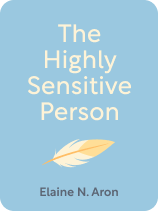

This article is an excerpt from the Shortform book guide to "The Highly Sensitive Person" by Elaine Aron. Shortform has the world's best summaries and analyses of books you should be reading.
Like this article? Sign up for a free trial here.
Are you a highly sensitive person? What are some ways to manage high sensitivity?
Being a highly sensitive person in modern society can be difficult, especially if you had a hard childhood or are still struggling to adapt personally, socially, or professionally. However, there are ways to manage high sensitivity and even use it to your advantage.
Keep reading for a highly sensitive person’s coping strategies and tips.
Ways to Deal With High Sensitivity
While high sensitivity isn’t a mental illness, being a highly sensitive person can be challenging. In her book The Highly Sensitive Person, Elaine Aron discusses ways to cope with the aspects of your trait that you may be having difficulty with as a highly sensitive person. Coping strategies include reframing your experiences with an understanding of your trait, seeking help through various types of therapy, and medication.
(Shortform note: Sometimes high sensitivity is misdiagnosed as other mental health conditions, such as ADHD, borderline personality disorder, or bipolar disorder. This can lead the HSP to be put on treatment regimens that are unhelpful or even harmful to them. If you’ve had a diagnosis of a mental illness but suspect you may be an HSP, consult with your doctor before beginning treatment and, if necessary, educate them about high sensitivity so they can better understand your situation.)
Reframe Past Experiences in the Context of High Sensitivity
Many HSPs find they can benefit from mentally reframing their experiences with their new understanding of their trait. If you grew up not knowing you were an HSP, you may have experienced failures that didn’t make sense to you and that made you feel less-than or broken. Reframing your perspective on these experiences can help you better understand yourself and your trait, deal with future challenges, and rebuild your self-esteem.
Reframing is a conscious effort. To reframe, Aron says you first need to reflect on a past experience and how you reacted to it. Consider how your reaction differed from the way you’ve seen others react to the same situation, and remember how you felt about your reaction—perhaps you felt that it was the wrong reaction or it made you feel inferior.
Next, reconsider that reaction based on what you now know about yourself. Was your reaction the result of your HSP traits? If you felt you responded too slowly to a frightening situation, for example, it was likely because you needed longer to process what was happening. Or if you felt you overreacted emotionally, remember that your trait heightens your emotions and your attunement to others’ emotions.
Finally, apply this new understanding to your present and future experiences. How can you reframe a current, negative experience so you feel better about yourself and can make a better choice in the future? Aron recommends talking to someone else about this new framing or recording it in writing.
Engage in Different Types of Therapy
Reframing can be done entirely on your own, but some HSPs also do well with therapy. Aron describes four types that have been shown to help: cognitive behavioral therapy, interpersonal therapy, physical therapy, and spiritual therapy.
Cognitive behavioral therapy focuses on changing the way you think and behave. It may involve getting better at certain tasks like socializing, or it may be focused on helping you learn to relax or get rid of irrational thoughts. These techniques can be done on your own, but it’s usually helpful to have a coach. A disadvantage of this technique is that it focuses on surface-level symptoms and sometimes treats sensitivity like an overreaction.
Interpersonal therapy is based on talking and building a relationship with your therapist or group. It draws from different schools of psychology and focuses on inner work, such as working through feelings of trauma or experimenting with ideas about the future. Aron particularly recommends Jungian analysis because of its focus on the unconscious mind and its incorporation of spirituality. A disadvantage of this approach is that it might be overly appealing to HSPs because they are so good at introspection, and it may be difficult to leave this type of therapy—which can be very expensive.
Physical therapy refers to any healing technique applied to the body. This can include exercise, diet, sleep, medications, sports, and massage. Aron points out that everything that happens to the body affects the mind, so physical therapy is a great way to help relax or heal the mind. With physical healing, it is particularly important to keep in mind that your body is more sensitive than the average body, and physical approaches can come with a lot of strong stimuli. If you’re already feeling overstimulated, for example, the intensity of a massage might make you feel worse than you did before. Be sure to discuss your sensitivity with anyone who is providing you with physical treatment.
The final type of healing Aron describes is spiritual healing. This includes things like religion, meditation, or connection with a higher power or self. Aron finds that HSPs respond particularly well to spiritual healing because they tend to look inward and desire to overcome overarousal through reframing, which many spiritual techniques offer.
Aron discusses a few disadvantages of spiritual healing: We might pursue it at the expense of other methods of healing, which can make us miss out on important information we could learn about our bodies and minds. We might also over-idealize spiritual leaders in our lives, which can lead us to become overly dependent on them, or worse—be taken advantage of. Finally, the principle of self-sacrifice underlying many religious and spiritual approaches can be harmful to HSPs who have low self-esteem.
(Shortform note: Another potential drawback of spiritual therapy is that some of it focuses on getting rid of unwanted emotions rather than processing them in a healthy way. This can cause a cycle in which repressing emotions makes you seek more spiritual healing, which causes you to repress even more. This can also be exacerbated by spiritual leaders who purposefully lead people into this cycle in order to make money. Be wary of spiritual leaders who are selling something or suggest that you can completely rid yourself of negative feelings.)
Consider Medication to Manage Your Sensitivity
Aron also says that some people might seek medication to change the way their sensitivity affects them. High sensitivity isn’t an illness, but the difficulty of living in a society not built for the sensitive can cause illness or distressing symptoms. She says medication can be a useful avenue for dealing with these symptoms but that it’s important to be informed about what you’re doing.
Some medications can be taken as needed to manage short-term overarousal. These are fast-acting anti-anxiety drugs, but they can make you sedated, and they’re addictive if taken for long periods. This includes medications like Valium and Xanax.
Other medications might be prescribed to manage long-term symptoms of sensitivity. These include antidepressants, such as Prozac and Zoloft, which take a few weeks to begin working and may be habit-forming—though they tend to be less addictive than the fast-acting anti-anxiety medications. These medications can help manage the effects of chronic overarousal, which tend to lead to depression.
Aron recommends learning as much as you can about these drugs and understanding what symptoms you want to treat before seeking medication, and she suggests finding a doctor who understands your trait and how these medications tend to affect sensitive people. She adds that there are natural ways to change your body’s chemistry such as herbal remedies, exercise, listening to music, and touch, among many others. Doctors aren’t likely to prescribe these methods, but they can be as or more effective than pharmaceuticals in managing symptoms of stress.

———End of Preview———
Like what you just read? Read the rest of the world's best book summary and analysis of Elaine Aron's "The Highly Sensitive Person" at Shortform.
Here's what you'll find in our full The Highly Sensitive Person summary:
- The strengths and challenges associated with being a highly sensitive person
- How to manage your sensitivity in your personal, social, and professional life
- Why you should stop labeling yourself as "shy"






